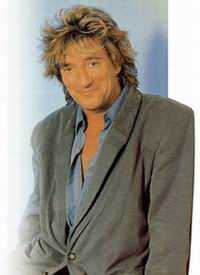BORN: January 10, 1945, London, England
b. Roderick David Stewart, 10 January 1945, Highgate, London, England. The leading UK rock star of the 70s started his career as an apprentice professional with Brentford Football Club (over the years Stewart has made it known that football is his second love). Following a spell roaming Europe with folk artist Wizz Jones in the early 60s he returned to join Jimmy Powell And The Five Dimensions in 1963. This frantic R&B band featured Rod playing furious harmonica, reminiscent of James Cotton and Little Walter. As word got out, he was attracted to London and was hired by Long John Baldry in his band the Hoochie Coochie Men (formerly Cyril Davies' All Stars).
Without significant success outside the club scene, the band disintegrated and evolved into the Steampacket, with Baldry, Stewart, Brian Auger, Julie Driscoll, Mickey Waller and Rick Brown. Following a television documentary on the swinging mod scene, featuring Stewart, he collected his moniker 'Rod the Mod'. In 1965, he joined the blues-based Shotgun Express as joint lead vocalist with Beryl Marsden. The impressive line-up included Peter Green, Mick Fleetwood and Peter Bardens. By the following year, Stewart was well-known in R&B and blues circles, but it was joining the Jeff Beck Group that gave him national exposure. During his tenure with Beck he recorded two important albums, Truth and Cosa Nostra-Beck Ola and made a number of gruelling tours of America.
When the group broke up (partly through exhaustion) Stewart and Ron Wood joined the Faces, now having lost their smallest face, Steve Marriott. Simultaneously, Stewart had been signed as a solo artist to Phonogram, and he managed to juggle both careers expertly over the next six years. Though critically well-received, his first album sold only moderately; it was Gasoline Alley that made the breakthrough. In addition to the superb title track it contained the glorious 'Lady Day'. This album marked the beginning of the 'mandolin' sound supplied by the talented guitarist Martin Quittenton. Stewart became a superstar on the strength of his next two albums, Every Picture Tells A Story and Never A Dull Moment.
Taken as one body of work, they represent Stewart at his best. His choice and exemplary execution of non-originals gave him numerous hits from these albums including; 'Reason To Believe' ( Tim Hardin ), 'I'm Losing You' ( Temptations ), 'Angel' ( Jimi Hendrix ). His own classics were the irresistible chart-topping magnum opus 'Maggie May' and the wonderful 'You Wear It Well', all sung in his now familiar frail, hoarse voice. In the mid-70s, following the release of the below average Smiler, Stewart embarked on a relationship with the actress, Britt Ekland. Besotted with her, he allowed her to dictate his sense of dress, and for a while appeared in faintly ludicrous dungarees made out of silk and ridiculous jump suits.
At the same time he became the darling of the magazine and gutter press, a reputation he unwillingly maintained through his succession of affairs with women. Atlantic Crossing was his last critical success for many years; it included the future football crowd anthem and number 1 hit, 'Sailing' (written by Gavin Sutherland), and a fine reading of Dobie Gray 's 'Drift Away'. His albums throughout the second half of the 70s were patchy affairs although they became phenomenally successful, selling millions, in many cases topping the charts world-wide. The high-spots during this glitzy phase, which saw him readily embrace the prevalent disco era, were 'The Killing Of Georgie', Cat Stevens' 'First Cut Is The Deepest', 'Tonight's The Night' and 'You're In My Heart'.
Other hits included 'Hot Legs' and the superbly immodest but irresistible number 1, 'D'Ya Think I'm Sexy'. His 'Ole Ola', meanwhile, was adopted by the Scottish World Cup football team, an area in which his popularity has always endured.
Stewart entered the 80s newly married, to George Hamilton IV 's ex-wife, Alana, and maintained his momentum of regular hits and successful albums; his large body of fans ensured a chart placing irrespective of the quality. The 80s saw Stewart spending his time jet-setting all over the world, with the press rarely far from his heels (covering his marriage break-up, his long relationship with Kelly Emberg, and the unceasing round of parties). Behind the jack-the-lad persona was an artist who still had a good ear for a quality song, a talent which surfaced throughout the decade with numbers like 'How Long' ( Paul Carrick ), 'Some Guys Have All The Luck' ( Robert Palmer ) and, reunited with Jeff Beck, a superb performance of Curtis Mayfield 's 'People Get Ready'.
His biggest hits of the 80s were 'What Am I Gonna Do', 'Every Beat Of My Heart' and 'Baby Jane'. As the 90s got under way Stewart, now re-married, indicated that he had settled down, and found an enduring love at last. His new guise has not affected his record sales; in April 1991 he was high on the UK chart with 'Rhythm Of My Heart' and had the best selling Vagabond Heart. Unplugged And Seated in 1993 boosted his credibility with an exciting performance of familiar songs. A new album in 1995 was his best for years and during the launch Stewart undertook some interviews which were both revealing and hilarious. The once seemingly pompous rock star, dressed to the nines in baggy silks was really 'Rod the Mod' after all.
Rod Stewart, one of the biggest 'superstars' of the century, has turned 50 without his audience diminishing in any way. His credibility as high as it had ever been, Stewart then released When We Were The New Boys, debuting at UK number 2 in June 1998. On the album Stewart covered newer material by 90s bands including Skunk Anansie ('Weak'), Primal Scream ('Rocks') and Oasis ('Cigarettes & Alcohol'). He also revisited the Faces on the single 'Ooh La La', originally sung by Ron Wood on the album of the same name.
